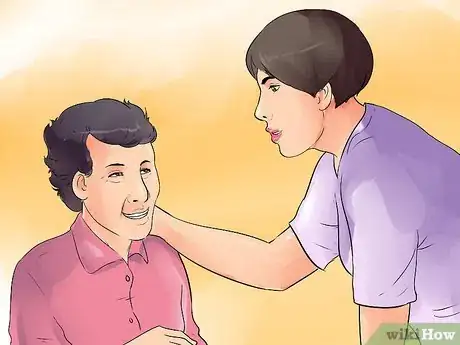This article was medically reviewed by Shari Forschen, NP, MA. Shari Forschen is a Registered Nurse at Sanford Health in North Dakota. Shari has worked in healthcare since 1996 and her expertise lies in acute care bedside nursing on a medical oncology floor. She received her degree from Medcenter one College of Nursing in 2003 and her Family Nurse Practitioner Masters from the University of North Dakota in 2014. Shari is a member of the American Nurses Association.
There are 8 references cited in this article, which can be found at the bottom of the page.
This article has been viewed 36,822 times.
Alzheimer's and dementia are devastating diseases, and those afflicted can be difficult to deal with. They can struggle with their ability to recognize faces, fail to remember the word for an everyday object, or repeat themselves. You can help improve their quality of life by learning some effective ways to communicate with them. [1]
Steps
Discovering New Strategies
-
1Remind your loved one who you are. If your loved one seems confused about your identity, give your name and explain how you are related.
- For example, “I’m Annie, your granddaughter. Your daughter Sue is my mom,” is better than just “I’m Annie.”[2]
-
2Make your words easier to understand. Speak slowly and clearly. Use simple words and short sentences. Break long actions into smaller steps.[3]
- Saying “We’re going to the grocery store to pick up a few things, then we’re going to the park across the street from the school, then we’ll see a movie at the mall” might be confusing. You might change it to “First we are going to the grocery store.” Give them a moment to process before proceeding. “Then we will go to the park.” Pause again. “Then we’ll go to the movie theater and see a movie.”
Advertisement -
3Take your time. Give the person some time to respond to questions. It takes dementia patients longer to process you are saying.[4]
-
4Use clear body language as an aid. Word retrieval (finding the right word to identify or describe) can be difficult for people with dementia. They may not be able to find the right word or understand what your word means. Encourage them to use gestures to describe what they are trying to say, and you can do the same.[5]
- If your loved one is not understanding what you mean when you say “Wash your hands,” you can pantomime rubbing your hands together, or even take go into the bathroom and demonstrate.
-
5Don’t argue. Not only does it increase everyone’s stress level, but people with dementia often genuinely feel confused. They may not remember asking the same question ten times, and they may not know where they put their medication. Remember, it is the disease, not the person, causing this behavior.
- Going along with their stories, even if you know they are false, can help keep the peace. Do not feel like you need to correct them.[6]
- If you find yourself getting frustrated and ready to argue, take a break. Give yourself a timeout.
-
6Treat the person like an adult. Be respectful.[7] Give as much independence as possible. Let them make the decisions they are capable of making.
- Depending on the intensity of the dementia, your loved one may not be capable of making many decisions, but be sure to give the opportunity as often as you can. Even small choices like, “Which shirt do you want to wear today? The blue one or the white one?” can help improve quality of life.
-
7Help with conversation prompts. Losing one’s train of thought is common with dementia patients. They may forget what they were talking about mid-sentence.[8]
- Pay attention to what is being said and help the person get back on track, and do not make a big deal out of it. Say in a lighthearted tone of voice, “Oh, you were just telling me about the dog you had growing up! Can you tell me more?”
-
8Show love and affection. Take the person’s hand, give them a hug or kiss if you (and they) are comfortable. Physical touch has been shown to have many positive benefits for people with dementia.[9]
-
9Talk about the good old days. Find a photo album of old pictures to share. This can help jog memories and start good conversations. You can learn more about your loved one’s life and family history, too.
-
10Let them believe that deceased loved ones are still alive. Sometimes, people with dementia think that dead loved ones (like a spouse or a sibling) are still alive. Insisting that the loved one is dead will only agitate and upset the elderly person. Forgetting about a difficult loss can be one of the few kindnesses of dementia, so let them be content, even if it means letting them be wrong.
- For example, if your grandma asks "Where is my husband?" and you know he is deceased, you could say "Where do you think he is?" If she says he is dead, then agree. If she says "I bet he's at the store," then try saying "Yes, he's probably out shopping."
Handling Dementia-Related Behaviors
-
1Deal with repetitive questions. People with dementia often don't remember what happened to them just a few minutes ago. Their short-term memory loss means they do not remember having asked the question in the first place.
- Try changing the subject to make them stop asking the question. For example, you might say something like, "Do you remember how we went to the choir concert? Did you like the concert?"
- You will often find that their long-term memories are still quite good, so changing the subject to a well-remembered past event may work to end the line of questioning. You might ask, for example, “Where were you the day Kennedy was shot?”
-
2Cope with anxiety and delusions. Your loved one may believe people are “out to get” them, believe someone is stealing from them, or other beliefs that create suspicion. This is common with Alzheimer’s and dementia.[10]
- Believing they have been robbed is a common delusion. Provide reassurance that they and their possessions are safe, perhaps taking a few minutes to help locate the “stolen” object.
- Consider having your loved one seen by a primary care physician or a psychiatrist to find a medication that will alleviate anxiety.
-
3Be prepared for frequent phone calls. If your loved one has been placed in an assisted living facility or nursing home, you may receive calls at all hours of the day and night, possibly one after the other. This can be extremely draining and require some management.
- Don't pick up the phone every single time. Consider putting your phone on silent at night.
- Listen to your loved one’s concerns and give assurance that you will help take care of the problem.
- If it is not an emergency, you do not need to drop everything to attend to the person all the time. Speak to the nurse at the nursing home if you are concerned there is a real problem that needs to be addressed.
-
4Consider letting it go if they think they're in the past. Sometimes people with dementia think they're in a past decade, meaning that they may call people by the wrong names and may think that deceased people are still alive. Trying to convince them that they're in the "future" isn't likely to work, so it's usually best to let it slide and have a nice conversation instead.
- If they ask where a deceased person is, ask "Where do you think they could be?" The person may say "In the cemetery," or they may say something like "Maybe they went to the store." Whatever they say, respond with "Yes, that's probably right." It's better not to make them relive the pain of losing that person.
Getting Additional Support
-
1Look for a support group. Look for a support group for caregivers of those with Alzheimer’s and/or dementia. You can contact your local senior services agency for suggestions, or try searching for one through the Alzheimer’s Association: http://www.alz.org/apps/we_can_help/support_groups.asp
- These groups can give you suggestions for ways to communicate with your loved one, as well as offer you comfort and reassurance. They are a great way to avoid feeling isolated, as many caregivers frequently do.
-
2Ask other loved ones to help out. Caring for someone with dementia is easier when multiple people are sharing the responsibilities. Here are some things that your loved ones could do:
- Come over and spend time with the person
- Help cook meals
- Take the person out to do something fun (from walking in the park to painting at the senior center)
-
3Find respite care. If you are your loved one’s primary caregiver, you will need a break now and then. Taking care of a person with dementia can be exhausting and all-encompassing, and you need to take care of yourself in order to effectively care for your loved one.[11] Here are some options:
- In-home care. You can have someone stay with your loved one at home while you get out of the house for a while.
- Senior day center. You can drop your loved one off (or, in some cases, have them picked up) for a few hours of activities and socializing.
- Residential facility. This can be an option if you need to have your loved one taken care of overnight, or for a few days if you need to go out of town.
-
4Talk to your family. Other family members involved in your loved one’s care can be an invaluable support. You can talk to them about the highs and lows of day-to-day care, suggest caregiving strategies, and blow off some steam.
-
5Talk to your loved one’s care team. The doctor, social worker, or nursing home staff may have suggestions in effective communication methods. Opening the lines of communication with others involved can only help improve the care they receive, because you will be a helpful source of information for these professionals as well!
-
6Ask the elderly person what they think would help them. One way to support their independence and well-being is to give them a say in what happens to them. While you can't always give them what they want, it can be nice to have their input.
References
- ↑ https://www.alz.org/care/dementia-communication-tips.asp
- ↑ https://www.alz.org/care/dementia-communication-tips.asp
- ↑ https://www.alz.org/care/dementia-communication-tips.asp
- ↑ https://www.alz.org/care/dementia-communication-tips.asp
- ↑ http://www.nhs.uk/conditions/dementia-guide/pages/dementia-and-communication.aspx
- ↑ http://www.mayoclinic.org/healthy-lifestyle/caregivers/in-depth/alzheimers/art-20047540?pg=2
- ↑ http://www.webmd.com/alzheimers/guide/improving-communication
- ↑ http://www.mayoclinic.org/healthy-lifestyle/caregivers/in-depth/alzheimers/art-20047540
- ↑ https://www.verywell.com/the-importance-of-touch-for-people-with-dementia-97641

















































































Medical Disclaimer
The content of this article is not intended to be a substitute for professional medical advice, examination, diagnosis, or treatment. You should always contact your doctor or other qualified healthcare professional before starting, changing, or stopping any kind of health treatment.
Read More...